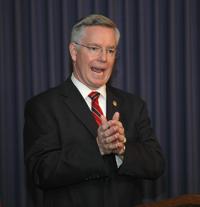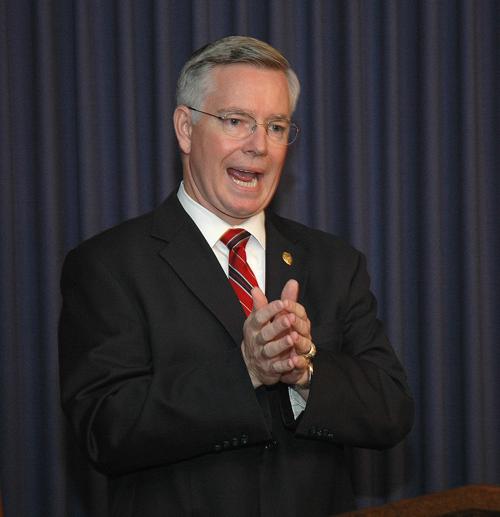PHOENIX — With their candidate squeezed out of the last screening, allies of Maricopa County Attorney Bill Montgomery are urging his nomination to the Arizona Supreme Court.
More than a dozen attorneys and public officials have submitted comments to the Commission on Appellate Court Appointments listing what they say are his qualifications to sit on the state’s highest court. That includes Attorney General Mark Brnovich, the state’s top prosecutor, who praised Montgomery’s “principled nature and dedication to the rule of law.”
More support is expected when the commission meets Friday to hear comments and interview the nine applicants to replace Scott Bales, who retired earlier this month.
The outpouring is occurring four months after the same commission was deciding who to recommend to Gov. Doug Ducey to fill the vacancy created by the resignation of John Pelander. And Montgomery, criticized over positions taken on gay and civil rights, was not on the list of nominees.
That list is crucial: The Arizona Constitution allows Ducey to choose only from those nominated. And if Montgomery can’t get his name on it, he can’t be considered.
What’s changed since March is that the governor has replaced several commission members, including at least three who voted not to forward Montgomery’s name to the governor. But gubernatorial press aide Patrick Ptak says his boss did not decide who to reappoint and who to replace based on their positions on Montgomery.
While Montgomery’s supporters are lining up for Round 2, so are some who contend that his biases would get in the way of being a judge.
Front and center are the Arizona chapter of the American Civil Liberties Union and Lambda Legal. Both are citing instances where they say Montgomery ignored the law.
One key incident both groups cite dates to 2015, when Montgomery, whose office is required to provide legal assistance to couples who are adopting, refused to do so for a gay couple even after a federal judge ruled that Arizona’s law banning same-sex marriage was unconstitutional.
Montgomery contended that decision still did not provide the same rights of gays to adopt.
When that argument faltered, Montgomery pushed the Legislature to repeal entirely, for all couples, that requirement for free legal help. It was only a veto by Ducey that blocked the maneuver.
“It appears unlikely that he would be able to provide impartial justice to LGBT people and their families if he were appointed to the Arizona Supreme Court, let alone the appearance of impartiality,” said attorneys for Lambda Legal, which gets involved in issues of gay rights.
Montgomery’s views on gay rights also came into focus when he helped kill a proposed rule for lawyers that would have made it an ethical violation for them to discriminate against clients based on their “gender identity.”
Montgomery sent out a note saying that if the change was approved there would be a “strong effort” to eliminate the requirement that attorneys belong to the State Bar of Arizona.
That killed the plan.
“Mr. Montgomery has made clear over the course of many years that he is unwilling to treat LGBT people equally under the law,” the attorneys for Lambda Legal wrote.
But the view is different for Gary McCaleb, senior counsel of the Alliance Defending Freedom, a Christian public interest law firm that has often ended up on the other side of issues with Lambda Legal.
McCaleb, who also served on that task force about gender identity, defended Montgomery and the way he handled himself. He said Montgomery stated his opposition “in very measured, logical, and legally grounded terms.”
But Analise Ortiz, campaign manager for ACLU Arizona, said Montgomery’s issues of bias go beyond sexual orientation.
That includes his 2014 decision to hire John Guandolo, a former FBI agent, to conduct training for law enforcement on the threat of Muslim terrorist groups. The invitation to the training said Guandolo, who left the FBI after an affair with a confidential source, said topics would include “threats posed to our local communities by Hamas, Hezbolla and Sharia Law.”
At the time, Imraan Siddiqi, president of the Council on American-Islamic Relations in Arizona, called Guandolo an “Islamophobe,” saying he was “creating a false correlation between being a Muslim and being prone to violence.”





